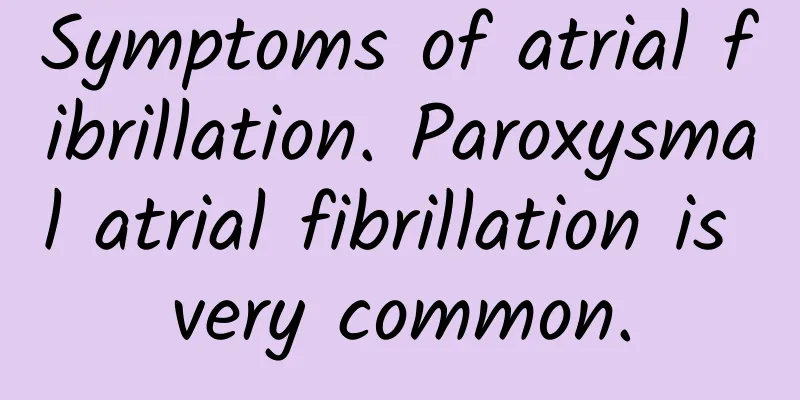What to do if you suffer from insomnia due to hyperthyroidism? Here are some ways to deal with it!

|
As we all know, patients with hyperthyroidism have a faster metabolism, accelerated heartbeat, and their nerves are often in an excited state. These manifestations are the natural enemies of sleep, so patients with hyperthyroidism are prone to insomnia. Long-term insomnia is very harmful. So what are some ways to solve the insomnia problem in patients with hyperthyroidism? 1. What to do if you have hyperthyroidism and insomnia For many years, sedatives, hypnotics, antidepressants, and anti-anxiety drugs have often been used to treat insomnia caused by hyperthyroidism. However, these drugs are not ideal, have large side effects, and are prone to dependence. Once the drugs are stopped, symptoms will immediately appear and insomnia will return immediately. Therefore, they are not suitable for long-term use. At the same time, taking large amounts of nerve-suppressing drugs can have very serious consequences and cause great pain to patients. It is recommended that patients with hyperthyroidism and insomnia can eat more foods rich in calcium to improve sleep. Foods rich in calcium include: milk, kiwi, sesame paste, sweet corn soup, etc. You can also drink a glass of hot milk before going to bed every night, and you can pair it with some biscuits, desserts, bread, etc. Milk contains a lot of calcium, but the rich protein in milk can have a refreshing effect. It can only promote sleep if used with foods with higher sugar content. 2. Why does hyperthyroidism cause insomnia? 1. Hyperthyroidism is an overactive thyroid gland. The thyroid gland is a very important organ in the human body. Many functions of the human body are affected by the thyroxine secreted by the thyroid gland. Hyperthyroidism will produce more substances that act on the nervous system, causing the patient's nerves to be in an excited state for a long time. At night, the nerves are still in an excited state, so it is not easy to fall asleep, and even the patient may not sleep all night. 2. Insomnia in patients with hyperthyroidism is also closely related to the symptoms of the disease. Patients will be physically and psychologically harmed. Many patients will experience symptoms such as palpitations, chest tightness, and shortness of breath. Even when sleeping and resting, these symptoms cannot be relieved. Some people even have persistent atrial fibrillation, causing the heartbeat to be like a wild horse that has run away from its reins. Even when resting at night, it cannot be relieved. This causes patients to be very worried and afraid, so it is naturally difficult for them to fall asleep at night. 3. Why do patients with hyperthyroidism suffer from insomnia? Insomnia can be induced by diseases. For example, patients with hepatitis B, hyperthyroidism and other diseases are at high risk of insomnia. Hyperthyroidism is a thyroid disorder that appears to have nothing to do with brain nerve function. But surprisingly, persistent insomnia is very common among patients with hyperthyroidism. The onset of hyperthyroidism is often caused by mental stimulation, and prolonged stimulation, infection and other stress factors can cause autoimmune dysfunction, leading to thyroid cell proliferation, and then symptoms such as tension, anxiety, and insomnia. In addition, from the perspective of traditional Chinese medicine, hyperthyroidism belongs to the category of diseases such as "goiter" and "palpitations". At the beginning, the disease is mostly caused by excess, which turns into deficiency as time goes by, especially yin deficiency and qi deficiency, resulting in a mixed disease of deficiency and excess. To be specific, this type of patient may show symptoms of phlegm and qi stagnation, qi stagnation turning into fire, and the evil fire and heat disturbing the mind, thus causing insomnia; or yin deficiency and yang hyperactivity, which can also cause internal disturbance of virtual heat, restlessness, irritability and insomnia; if the patient belongs to the type of qi and yin deficiency, then the yin and yang will be out of balance and the patient will have restless sleep at night. |
<<: What medicine should I take for heat, cold and flu? Medical experts recommend these 5!
>>: How to treat white spots on lips? This is the professional method!
Recommend
What should I eat to supplement low platelets? Eat more of these foods
If a child has anemia, you should pay attention t...
The effects and taboos of Leihuozhi
Leihuo moxibustion is a health care method based ...
Why does a man’s urine turn yellow? What causes it?
The condition of a man's urine often reflects...
What causes myocardial ischemia? Three causes are at work!
The incidence of myocardial ischemia is increasin...
The leucorrhea is dry and hard on the underwear
For women, leucorrhea can be said to be a very im...
There is a lump above the collarbone on the neck
There are many lymph nodes in the neck area, and ...
Early symptoms of diabetes
As people pay less and less attention to their li...
What causes itching on the soles of feet?
The itching on the soles of the feet may be cause...
Can I drink coconut water while pregnant?
It is also beneficial to drink some coconut water...
What is the cause of frequent urination and frequent farts?
Urination and farting are both very normal ways f...
What food is better to eat when you have a fever
If you don't pay attention to reducing the te...
Why does the cervical spine make a sound when moving?
For some people, when their cervical spine is sha...
How to have a physique that doesn’t gain weight?
In life, there are still a lot of obese people, a...
Renal cyst grading
The grading of renal cysts is a classification st...
Can wound infection and suppuration heal on its own?
If the wound is infected and festering, it means ...









